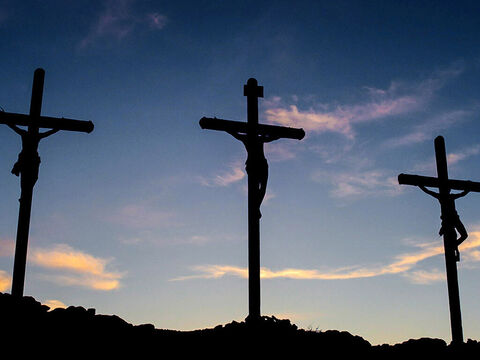
And being found in appearance as a man, He humbled
Himself and became obedient to the point of death, even the death of the cross
(Philippians 2:8).
The iconic figure of the Reformation was Martin Luther who declared, “the Cross alone is our theology”
Why would he say that?
In the era of 16th century, the Roman Catholic Church was promoting a theology of glory, defined as men and women working their way back to God – attempting to obtain His favour – by living out the Law and making themselves more holy and self-righteous.
The Cross of Christ was thought of as an example
of self-sacrifice.
It was into that context that Luther thundered, contrasting the opinions of the theologians of his day with a theology of the crucifixion of Christ: “A theologian of glory says that evil is good and good is evil. A theologian of the cross says that a thing is what it actually is.”
Luther was calling Christ-followers to embrace, to supremely value, to live under the transformative theology of Christ’s Cross as central to their faith and practice.
And in so doing, Luther was firmly in the camp of the
Apostle Paul who understood the scandal of the Cross
…but we preach Christ crucified: a stumbling-block (Gk skandalon) to Jews and foolishness to Gentiles…(1 Corinthians 1:23).
Corinth in
Greece is the site of one of the most comprehensive recovery of ancient ruins anywhere
in the world, proving it was a city of importance and significant prosperity.
At the time
of the New Testament, Corinth was a city of approximately 200,000; however, it
is estimated that there may have been hundreds of thousands more identified not
as citizens, but as slaves.
Corinth
boasted 3 ports on 3 seas: the Aegean, the Adriatic, and the Mediterranean
making it a cosmopolitan centre of status and prosperity.
Professor of New Testament studies Gordon Fee has characterized the city as “the New York, Los Angeles, and Las Vegas of the ancient world”.
After having
visited the city, the Apostle Paul proclaimed, For I resolved to
know nothing while I was with you except Jesus Christ and him crucified (1
Corinthians 2:2).
Was that
simply apostolic hyperbole? Was Paul unaware of the innumerable problems in Corinth
and in the Corinthian church?
No.
Paul, as the writing of his 2 letters to the church at
Corinth articulates in great detail, was intimately familiar with the
difficulties, the tensions, the divisions, and the selfishness that was
percolating, sometimes just under the surface and in other situations, leaching
out for all to see.
But, Paul’s solution to the myriad and toxic complications was solely to preach the Cross of Christ.
I can almost hear the elitist Corinthian response: WHAT???
“How scandalous! How irrelevant! How missing the issue was that! How disconnected to reality and beside the point! How detached from reality and the issues we face!”
Many would have protested, “we need something practical, sensible, pragmatic.”
“Why don’t you analyze our governance model? Assess our children’s ministry? Review our program of music? Introduce some counselling?”
“How scandalous to begin with the crucifixion! How does that relate to who we are and what is going wrong?”
Of course, Paul realized all of that – and better than anyone else.
But for Paul it starts with the outrage of the Cross of
Christ: that God would become human and step into the world that He had created
to die horrifically as a despised criminal for the sins of those who hated Him.
That was the scandal of the Cross of Christ.
And it remains, from God’s point of view, the central event in human history.
Of the tens of thousands of victims that hung on Roman
crosses, one Cross stands apart as supreme, transcendent, and unique.
That was true in the 1st century and remains
true in the 21st.
Luther’s assertion continues to If the foundation of our theology is correct – with the Cross at its rightful place of ultimate Gospel centrality – other things will fall into place by the relentless power of the Holy Spirit.
Episcopalian author Fleming Rutledge, speaking of the Cross: “We are set in motion by its power, energized by it, upheld by it, guaranteed by it, secured by it for the promised future because it is the power of the creating Word…”
Takeaway: The Cross of Christ is the core of the biblical Gospel; the Cross is the Scripture’s theme tying together the various threads of the Gospel tapestry: love, forgiveness, justice, and truth.
Consequently, Luther exclaimed: “My conscience is held captive by the Word of God.”
For God was pleased to have all his fulness dwell in [Christ],
and through him to reconcile to himself all things, whether things on earth or
things in heaven, by making peace through his blood, shed on the cross
(Colossians 1:19,20).
~graphic – freebibleimages.com lumo project